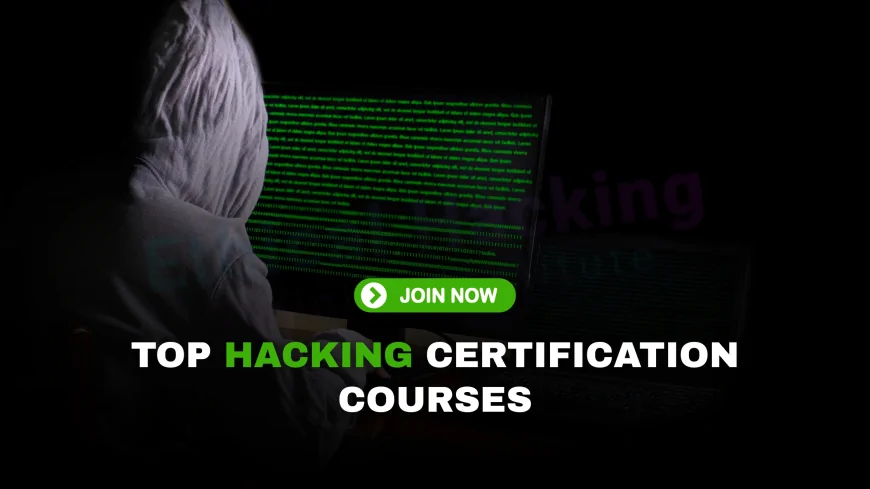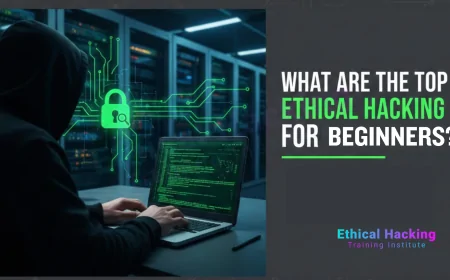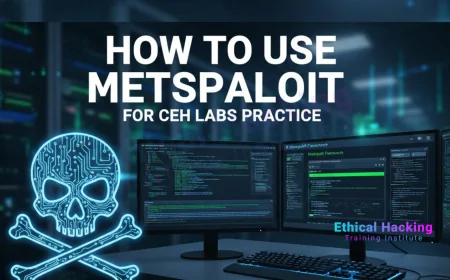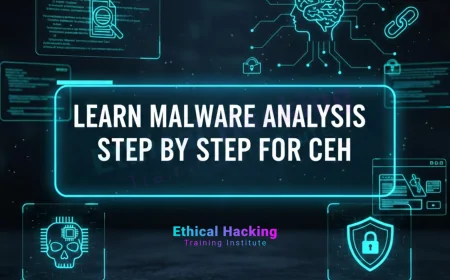Hacking Certification Courses: Unlock Your Cybersecurity Potential | Learn Ethical Hacking: Certification Programs to Power Your Career
Discover the best hacking certification courses in 2025. Compare CEH, OSCP, GPEN, and more to boost your ethical hacking skills and cybersecurity career.

Table of Contents
- Introduction
- Why Hacking Certifications Matter in 2025
- Top Hacking Certification Courses
- Course Comparison at a Glance
- How to Choose the Right Certification
- Training & Preparation Path
- Hands-On Practice: Labs & CTFs
- Applying Skills to Real-World Roles
- Investing: Cost vs Career Value
- Future Trends in Hacking Certifications
- FAQs
- Conclusion
Introduction
In 2025, cybersecurity stands at the forefront of global tech transformation—and certified ethical hackers are the frontline defenders. This guide dives into **hacking certification courses** that equip you with practical skills, recognized credentials, and career‑building power. From foundational programs to advanced penetration‑testing credentials, learn which courses align with your cybersecurity ambitions, how to prepare, and how to turn certifications into real career opportunities.
Why Hacking Certifications Matter in 2025
- Industry Trust: Employers, governments, and finance institutions prioritize recognized credentials.
- Skill Validation: Certifications like CEH, OSCP, GPEN, and Pentest+ bridge theory and reality.
- Career Acceleration: Certified professionals land roles up to 30% faster than uncertified peers.
- Global Relevance: These credentials are respected across regions—from North America to APAC.
Top Hacking Certification Courses
1. Certified Ethical Hacker (CEH v13)
Offered by EC-Council, CEH v13 teaches hacking methodology and tools—Nmap, Metasploit, Burp Suite, and more—through 20 modules and iLabs. Pass both MCQ exam and optional Practical to earn CEH Master status.
2. OSCP (Offensive Security Certified Professional)
A hands‑on ethical hacking credential recognized for its grueling 24‑hr lab exam. No multiple‑choice—just continuous real‑world penetration testing and detailed reporting.
3. CompTIA PenTest+
A mid-level, vendor-neutral credential combining MCQs and performance-based tasks. Great for beginners stepping into penetration testing.
4. GIAC GPEN
SANS‑backed, this certification focuses on methodology, tool usage, and exploitation techniques. Reinforces professional-standard practices.
5. CyberSec First Responder (CFR)®
A hybrid defense/offense credential emphasizing threat analytics, incident response, and adversary thinking with some hacking modules.
6. eCPPT (eLearnSecurity Certified Professional Penetration Tester)
Hands‑on, real‑world penetration testing certificate with unrestricted retake of the practical exam—perfect for skill focus.
Course Comparison at a Glance
| Certification | Level | Format | Hands‑on | Ideal For |
|---|---|---|---|---|
| CEH v13 | Intermediate | MCQ + Practical | Yes (iLabs) | Beginners–Mid |
| OSCP | Advanced | Lab Exam + Report | All‑lab | Pen‑tester aspirants |
| PenTest+ | Entry–Mid | Performance + MCQ | Limited | New pentesters |
| GPEN | Mid–Advanced | MCQ + Lab | Moderate | Method‑centric pros |
| eCPPT | Mid–Advanced | Lab Exam | Heavy | Hands‑on learners |
How to Choose the Right Certification
- Assess your current skill level: choose entry, intermediate, or advanced path.
- Career goals: focus on penetration testing, defense, or hybrid roles.
- Learning format: MCQ-heavy vs all‑lab exams.
- Budget & time considerations: OSCP invests more time than PenTest+.
- Industry recognition: OSCP/GPEN carry strong weight in pentesting jobs.
Training & Preparation Path
Preparing for a hacking certification requires more than just reading a textbook—it demands a structured approach combining theory, tools, hands-on labs, and mindset development. Whether you're targeting CEH, OSCP, GPEN, or CompTIA PenTest+, here’s a step-by-step roadmap to help you succeed.
1. Start with the Fundamentals
Before diving into hacking-specific content, make sure you understand the core concepts of:
-
Networking: TCP/IP, DNS, firewalls, ports, protocols, VPNs.
-
Operating Systems: Focus on Linux (Kali, Ubuntu) and Windows environments.
-
Command Line Interfaces: Bash, PowerShell, basic scripting (Python, Bash).
Resources: Cisco’s Networking Basics, LinuxCommand.org, CompTIA Network+ (optional).
2. Select Your Target Certification
Choose a hacking certification based on your experience level and career goals:
| Certification | Level | Focus |
|---|---|---|
| CEH v13 | Intermediate | Hacking methodology & tools |
| OSCP | Advanced | Practical pentesting & reporting |
| PenTest+ | Entry | Performance-based assessment |
| GPEN | Intermediate | Exploitation methodology |
| eCPPT | Mid-Level | Lab-based ethical hacking |
3. Use Official Courseware & Online Platforms
Enroll in official or high-quality third-party training:
-
CEH: EC-Council iClass, Simplilearn, or GreyCampus.
-
OSCP: Offensive Security PWK (Penetration Testing with Kali).
-
PenTest+: CompTIA CertMaster Learn.
-
GPEN: SANS SEC560 course.
Combine this with platforms like:
-
TryHackMe (guided rooms)
-
Hack The Box (realistic labs)
-
TCM Security Academy
-
PortSwigger Web Security Academy
4. Build a Personal Lab Environment
Set up a home lab for experimentation:
-
Use VirtualBox or VMware to create isolated networks.
-
Install Kali Linux for tools like Nmap, Burp Suite, Hydra, etc.
-
Add vulnerable VMs like Metasploitable2, DVWA, OWASP Juice Shop.
This setup allows safe practice for reconnaissance, exploitation, and post-exploitation.
5. Master Key Tools & Techniques
Familiarize yourself with the most widely used offensive security tools:
-
Scanning & Recon: Nmap, Netcat, Recon-ng
-
Exploitation: Metasploit Framework, SQLmap, msfvenom
-
Web Hacking: Burp Suite, OWASP ZAP
-
Password Cracking: John the Ripper, Hydra, Hashcat
-
Sniffing & Spoofing: Wireshark, Ettercap
Practice using them ethically and legally in lab environments.
6. Daily Practice + Notes
Create a structured schedule (e.g., 1–2 hours/day):
-
Week 1–4: Networking + Linux + tool basics
-
Week 5–8: Core modules of certification (e.g., system hacking, web apps)
-
Week 9–12: Full labs, mock tests, CTFs
Keep a hacking journal: document commands, flags, exploits, and errors.
7. Participate in CTFs and Challenges
Join real-time hacking games and events:
-
CTFtime.org: Global events calendar
-
picoCTF: Beginner-friendly challenges
-
OverTheWire: Linux-based skill games
-
Hack The Box CTFs: Higher realism with scoring
These reinforce knowledge and help you think like an adversary.
8. Use Practice Exams & Simulators
Mock exams help you:
-
Get familiar with test formats
-
Learn time management
-
Identify weak topics
Sites: Boson (for CompTIA), CEH mock test engines, OSCP-like practice labs (Proving Grounds).
9. Learn Reporting and Documentation
Especially for OSCP and GPEN, reporting is crucial:
-
Learn to write clear, step-by-step exploit documentation
-
Use Markdown or Word templates to practice
-
Include screenshots, command syntax, and mitigation suggestions
10. Join Communities and Forums
Engage with others preparing for the same cert:
-
Reddit: r/hacking, r/OSCP, r/netsecstudents
-
Discord groups: TryHackMe, TCM Security
-
LinkedIn & Twitter: Follow ethical hackers and certification experts
Asking questions and sharing tips boosts your learning curve.
Summary Table: Hacking Prep Essentials
| Step | Action |
|---|---|
| Fundamentals | Learn networking, Linux, scripting |
| Choose Certification | Match cert to skill level and career focus |
| Training | Use official content or platforms like TryHackMe |
| Lab Setup | Build isolated VMs with Kali and vulnerable targets |
| Tools Mastery | Practice Nmap, Metasploit, Burp Suite, SQLmap |
| Schedule | Study daily with milestones |
| CTFs | Boost creativity through hacking competitions |
| Mock Exams | Simulate test conditions |
| Reporting | Document your processes like a professional |
| Community | Collaborate, ask, and learn with others |
Hands-On Practice: Labs & CTFs
- Platform Labs: iLabs, TryHackMe, Hack The Box offer guided scenarios.
- Personal Lab: Use VirtualBox with vulnerable VM images.
- CTF Competitions: OverTheWire, picoCTF, CTFtime events sharpen exploitation and creative problem-solving.
Applying Skills to Real-World Roles
Use certification skills by joining bug bounty programs (HackerOne, Bugcrowd), internships, or startup hack-projects. Document and share write-ups—build your portfolio and credibility.
Investing: Cost vs Career Value
- CEH: ~$1k–1.5k
- OSCP: ~$1.5k–2.2k including lab access
- PenTest+: ~$350
- GPEN: ~$1k
Calculate ROI: certified professionals typically earn 20–30% more and access mid-to-senior roles faster.
Future Trends in Hacking Certifications
- AI-powered lab environments with dynamic threat simulations.
- More cloud / OT-sec focused credentials
- Adversary emulation certifications (Red Team specific content).
- Shorter modular learning paths that stack into full credentials.
FAQs -
1. Which certification is best for beginners?
CompTIA Pentest+ or CEH v13 are ideal for new entrants into pentesting.
2. Is OSCP worth it?
Yes—if you're serious about penetration testing and can commit time to labs.
3. Do these courses expire?
Yes—annual or triennial renewals often require continuing education credits.
4. What is the difference between CEH and OSCP?
CEH includes theory and labs; OSCP is entirely practical and report‑driven.
5. Can I self-study?
Yes—with discipline. Labs and CTF practice are essential to success.
6. How do I prepare for practical exams?
Practice in live labs, document steps, and write detailed reports.
7. Is CEH recognized by employers?
Yes—it is widely accepted across industries and government bodies.
8. What tools are commonly used?
Nmap, Metasploit, Burp Suite, Wireshark, Hydra, SQLmap, among others.
9. How long do these courses take?
CEH/Pentest+: ~3–6 months; OSCP: ~6–12 months depending on experience.
10. Is hands-on essential?
Absolutely—labs and CTFs are non-negotiable for skill acquisition.
11. Can I work in bug bounties with just CEH?
Yes—many beginners start bounty hunting after CEH and lab practice.
12. What career roles open after certification?
Penetration Tester, Security Analyst, Red Team Operator, SOC Engineer.
13. What certifications stack well?
CEH → OSCP → CISSP is a strong skill and career path progression.
14. Are there free resources?
Yes: OverTheWire, OWASP Juice Shop, TryHackMe free rooms, YouTube tutorials.
15. What is a CTF?
Capture-The-Flag: a security game format where you solve challenges to capture hidden “flags.”
16. Can I become a hacker without certification?
Yes—but certification accelerates job opportunities and credibility.
17. How much do certified pentesters earn?
US average $90K–$140K depending on experience and certification.
18. How do I renew certifications?
Through continuing education credits, retaking exams, or professional activity.
19. Should I specialize after certification?
Yes—specialize in cloud pentesting, mobile hacking, or red teaming as your next step.
20. How do I build a cybersecurity portfolio?
Share reports, CTF write-ups, bug bounty disclosures (where legal) and GitHub projects.
Conclusion
Hacking certification courses are the key to elevating your cybersecurity career. From foundational credentials like CEH and Pentest+ to advanced, fully hands-on programs like OSCP and GPEN, each path offers unique benefits. The best approach: assess your goals, invest in labs and CTFs, and apply your knowledge through real-world challenges. Your certification is not just a certificate—it’s a launchpad into the elite world of cybersecurity professionals.
What's Your Reaction?
 Like
0
Like
0
 Dislike
0
Dislike
0
 Love
0
Love
0
 Funny
0
Funny
0
 Angry
0
Angry
0
 Sad
0
Sad
0
 Wow
0
Wow
0

















